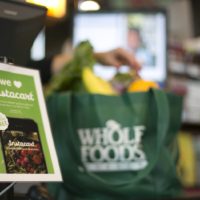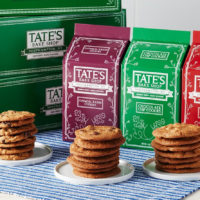
Source: Go Dairy Free
Every week we track the business, tech and investment trends in CPG, retail, restaurants, agriculture, cooking and health, so you don’t have to. Here are some of this week’s top headlines.
The farm bill became a bargaining chip in the heated intraparty battle over immigration on the House floor Friday. A revote is set to occur on June 22nd. The USDA revealed prototypes for GMO labels, which appear more like propaganda for the industry.
In CPG news, Rebbl has raised $20 million to expand into big box retailers. Campbell’s CEO Denise Morrison suddenly stepped down after her bet on fresher foods failed to revive sales.
Meal kits are moving in-store–Blue Apron is rolling out a national series of pop-up events, and Kroger is buying Home Chef for up to $700 million.
Check out our weekly round-up of last week’s top food startup, tech and innovation news below or peruse the full newsletter here.
_______________
1. House Farm Bill Collapses Amid Republican Disarray – New York Times
A rebellion from conservative lawmakers sank a vast farm policy bill on the House floor Friday amid a fight over how to proceed on immigration.
2. USDA Unveils Prototypes for GMO Food Labels, and They’re…Confusing – NPR
The labels use the letters BE, for bioengineered, not GMO, which critics say could baffle consumers. One design features a smiling sun that a skeptic calls propaganda for the industry.
3. Herb-Infused Coconut Milk Rebbl Raises $20M from Cavu Venture Partners – CNBC
The company will use new funds for marketing, innovation and moving into more convenient retailers including Safeway and Stop N Shop. The new investment values it at close to $100m.
4. Campbell CEO Departs After Bet on Fresh Food Falls Short – Wall Street Journal
Denise Morrison stepped down on Friday, and the company said it might sell some brands, after a bet on fresher foods under her leadership failed to revive sales.
5. Amazon Go — a Cashierless Version of 7-Eleven — Is Expanding to San Francisco and Chicago– Recode
Recode previously reported that the company planned to open up to six new locations this year.
6. Blue Apron Goes All-Out on Brick and Mortar – Retail Leader
A week after announcing it would sell its meal kits at Costco, the company isrolling out a national series of pop-up events intended to bring communities across the country together in celebration of home cooking.
7. UK: Whisk, the Smart Food Platform That Makes Recipes Shoppable, Acquires Competitor Avocando – TechCrunch
Whisk is acquiring the tech, customer base, integrations and team for an undisclosed sum. The UK startup has a B2B data platform to power food apps.
8. PayPal Just Dropped $2.2 Billion to Compete With Square in Restaurants and Cafes – Skift Table
PayPal is buying Swedish small-business platform iZettle for $2.2b to expand in Europe and Latin America and increase its presence in brick and mortar stores.
9. Kroger to Buy Home Chef in Latest Move to Get Meal Kits in Grocery Stores – CNBC
The initial price is $200m and could go up to $700m over the next five years in exchange for Home Chef meeting certain milestones, including significant growth of in-store and online meal kit sales.
10. Crowd Cow, Offering Ranch to Table Meats, Picks Up $8M from Madrona, Ashton Kutcher – TechCrunch
Crowd Cow plans to use the funding to continue expansion into different proteins and new markets, as well as opening new distribution centers to speed up delivery to customers.
11. Deliveroo Announces £5M ‘Innovation Fund’ to Support UK Restaurants – CateringToday
The company aims to bring in new menus and measures that will be more compatible with the delivery app. It is also looking into ways to fund more ‘dark kitchens’ that allow chefs and restaurants to cook meals for delivery only.
12. High Brew Coffee Closes ‘ Non-Traditional’ $20M Funding Round – Food Navigator
The investment was led by Charles Street Partners and will go towards digital advertizing and furthering its Amazon partnership.
13. EAT Club Acquires Healthy Food Startup Farm Hill – TechCrunch
The corporate lunch service with a customer base that includes Flipboard, Mastercard and TaskRabbit has acquired Farm Hill, a lunch box delivery service, to solidify and expand its presence in the Bay Area. Terms of the deal were not disclosed.
14. Denmark: Connecterra Raises €4.2M Series A for AI-powered Dairy Tech – AgFunder
The round was led by Sistema VC with new investment from AgFunder, 7 Percent Ventures, Acequia Capital, and industry veteran Henk Bles. Connecterra will use the funding to further develop its technology, expand into new markets and grow its team.
15. France: Algaia Raises €4M to Expand Algae Product Portfolio and Extraction Technology – AgFunder
Maabarot Products invested the additional equity capital to support Algaia’s expansion of its production facility and innovation center. The company manufactures algae-based products for agriculture feed, personal care and nutraceutical industries.
16. The Impossible Burger Is Officially Certified Kosher – Grub Street
Jewish people who keep kosher can finally sink their teeth into “bleeding” plant burgers.
17. Plastic Straws Might Soon Be Banned in New York City – Grub Street
A new bill even proposes $100 fines for violators.





